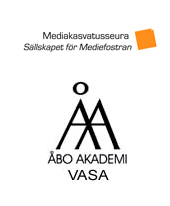KEYNOTE 1
Birgitte Tufte: Media Culture - School Culture - Partners or comptetitors?Birgitte Tufte opened her speech by giving us short history of media education as follows:
- from moral panic to active participation
- to teach about the bad influence of the media
- film, tv entered the schools (60's and 70's) -> high culture separated from local culture, school representing the first one
- popular media in a broader sense acknowledged in school
- fourth phase (2000-), focus on computers, the Internet
She said that two trends can be distinguished and these trends also affect the way in which schools in the various countries approach the area of media education. A) a top-down trend - moralistic approach and b) a bottom-up trend = a democratic approach. (Tufte, 1999.)
Since the conference takes place in Finland, Birgitte Tufte wanted to mention a Finnish pioneer of media education, Sirkka Minkkinen whose writings in 1980's have influenced the way we look at media education today.
She showed us statistics from various studies showing the intensity of Internet and mobile phone use of young people and highlighted the fact that the school practices are drifting further away from the day to day lives of their students. Many of the students say that they would like to learn more about media use in school and there is a need for better awareness of the need of crititical literacy skills. But the students feel that they are not getting this in schools. As one 13-year-old Danish boy puts it: " The teachers do not know very much... most of them are old"
In her speech Tufte then moved away from the school environment and raised another issue concerning young children as consumers. She talked about a research project "Tweens between media and consumption". Tweens are a group of "in betweens", in between childhood and adolecence. She said that these "split personalities" toggle between behaviours and attitudes of teenagers. Marketers are increasingly orienting themselves towards tweens as a consumer group. She also predicted online shopping to increase tremendously in the future.
She returned back to the school and talked about two school-based research projects. In the first project they tried to map the problematic areas where there is a void in respect to media education and one conclusion can be said to be that the teachers are quite clueless when it comes to media. The second project was about peer learning amongst teachers, using peer mentoring to exchange experiences and learn more about pedagogically sensible ways for media education
I think this is it, time to give the floor to you. What do you think? Are schools lagging behind? And if so, is it because the teachers are "out", or why is it so? Any other thoughts inspired byTufte's speech?





